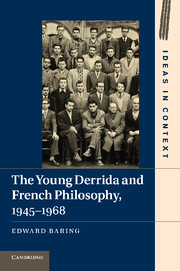Part I - Derrida post-existentialist
Published online by Cambridge University Press: 05 November 2011
Summary
Derrida post-existentialist
My intention to read Derrida's thought within the French philosophical tradition, indeed to use him as a privileged guiding thread for tracing the twists and turns of postwar intellectual history in France, very quickly confronts the question of Derrida's personal history and in particular his family roots in Algeria: How can a Sephardic Jew from North Africa be an exemplary French philosopher? The question is rendered more pressing because Derrida's Algerian heritage has played a far more prominent role in standard interpretations of his work than colonial history has for other French philosophers born in North Africa such as Louis Althusser and Alain Badiou. The biographical impulse can be explained in part by the attractive parallels between Derrida's early life and his philosophy of deconstruction; scholars have been tempted to present the two as different facets of the same story, even to the point of suggesting a causal relation. A recent biography begins thus: “Derrida's thought cannot be understood apart from his life. From the beginning, he was an intellectual outsider, a rebel.” Derrida was born in Algeria, supposedly at the edge of the French Empire (though in Algiers, perhaps the least marginal part of France's imperial holdings), and he was a Jew, heir to memories of exclusion and marginalization. Derrida's personal history thus seems to reflect the very themes that would come to preoccupy him in his philosophical writings; the philosopher of the margins was himself located at the margins of French society and culture.
- Type
- Chapter
- Information
- The Young Derrida and French Philosophy, 1945–1968 , pp. 15 - 20Publisher: Cambridge University PressPrint publication year: 2011



